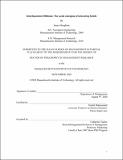Interdependent diffusion : the social contagion of interacting beliefs
Author(s)
Houghton, James P.Ph. D.Massachusetts Institute of Technology.
Download1227097368-MIT.pdf (5.842Mb)
Alternative title
Social contagion of interacting beliefs
Other Contributors
Sloan School of Management.
Advisor
Hazhir Rahmandad.
Terms of use
Metadata
Show full item recordAbstract
A common simplifying assumption in theories of social contagion is that ideas or beliefs spread from person to person in a social network without regard to other ideas or beliefs that spread concurrently. This assumption is both useful and generative, as it allows researchers to produce tractable models of the effects of network structure and social reinforcement on diffusion patterns. Unfortunately, the social contagion of multiple beliefs cannot be understood by linearly superimposing the results of independent contagion processes. Any decision that a human makes to adopt an idea or belief is influenced by the other ideas and beliefs that she already holds. This dissertation shows that interdependence between beliefs alters the progress of social contagion to create internally-consistent clusters of beliefs within subsets of the population (worldviews) and contributes to polarization. The first paper of this dissertation comprises a method for observing the evolution of broadly-held structures of beliefs. The paper uses a case study with social media data to demonstrate the clustering of beliefs that emerges due to their mutual interaction. The second paper introduces a formal theory of interdependent diffusion which attempts to explain the mechanisms by which micro-scale interactions between beliefs lead to macro-scale outcomes for societies. The third paper reports an online laboratory experiment to test whether the predicted theoretical outcomes hold when the decision rules of simulated agents are replaced with actual human actors exchanging actual information.
Description
Thesis: Ph. D., Massachusetts Institute of Technology, Sloan School of Management, September, 2020 Cataloged from student-submitted PDF version of thesis. Includes bibliographical references.
Date issued
2020Department
Sloan School of ManagementPublisher
Massachusetts Institute of Technology
Keywords
Sloan School of Management.